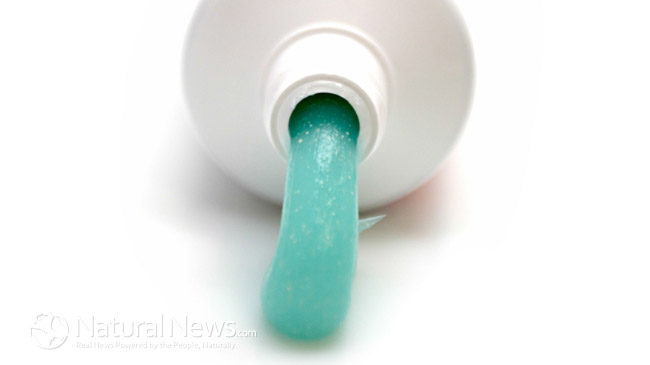Are you aware that you can create your own toothpaste at home with just a few easy ingredients that you might already have in your kitchen? How about that the toothpaste you make can actually be more beneficial to your teeth and gums than commercial toothpastes that you buy in a store? You can avoid all of the toxins and chemical ingredients in commercial toothpastes, while improving your dental health and even saving yourself some money.
I began making my own toothpaste about a year ago after I discovered a few ingredients in my “natural” toothpaste that I really wasn’t too comfortable using. I’ve seen tons of homemade recipes. Some contained as many as 30 ingredients, ingredients that were more than $30 each. I have found that simpler, in this case, is better. This toothpaste is an effective and healthy alternative and is very easy (and cost effective) to make with only 3 ingredients.
Ingredients You Should Consider Avoiding in Commercial Toothpastes
All commercial toothpastes contain harmful and toxic ingredients, like titanium dioxide (which is used to color paint), glycerin (which counteracts remineralization – or healing cavities naturally), FD&C Blue Dye # 1 & 2, sodium lauryl sulfate, and sodium fluoride. Did you know that sodium fluoride is a by-product of aluminum manufacturing, and can even be found in industrial pesticides and rat poisons? Check the ingredients in your toothpaste and I bet you’ll find at least one of these, if not several. These ingredients are even being found in toothpastes that are labeled “all natural”, particularly the sodium fluoride. These chemicals are not only harmful to your delicate tooth enamel, they also affect your overall health.
Scary stuff, huh? Don’t worry though, there are alternative methods for cleaning your pearly whites…
I have found a replacement that I enjoy using and even have fun making. I like that I can change the recipe based on my personal preference at the time (minty, fruity, sweeter, etc. — based on the essential oil added).
If you’re not into the idea of making your own toothpaste at home, Organic Tooth Soaps are non-toxic options that are available that do wonders, and still deliver the added benefits of the essential oils in their recipes, while still allowing remineralization to take place.
Related reading: Tooth Remineralization 101: Never Sit In Another Dentist’s Chair Again
How Coconut Oil Toothpaste Works
Coconut oil is antifungal, antibacterial, and antimicrobial. A study conducted in 2012 demonstrated that coconut oil destroys the bacteria that can cause tooth decay. (1) In this study, they exposed steptococcus mutans, which is a nasty bacteria that causes tooth decay, to coconut oil and found that the coconut oil destroys the bacteria without fail. These same scientists believe that coconut oil should be the central ingredient for toothpastes and mouth washes. This way, your teeth will have added protection that they don’t receive with regular toothpaste.
The other primary ingredient used in this toothpaste recipe is baking soda. Baking soda is a very mild abrasive which aids in whitening and cleaning teeth, in addition to restoring pH balance.
Homemade Baking Soda And Coconut Oil Toothpaste Ingredients:
6 tablespoons Raw Organic Virgin Coconut oil
2 tablespoons Baking Soda (Always Aluminium Free)
20-30 drops of Essential oil (Peppermint, Spearmint, Myrrh, Cinnamon, Clove)
Store in glass container
Instructions:
1. Mix baking soda and coconut oil in a glass container, until it forms a paste like consistency
2. Add essential oil of choice and mix
The Benefits of Essential Oils in Toothpaste
More than just flavoring for your toothpaste, essential oils have healing properties of their own that will benefit your mouth. These are the 5 most beneficial essential oils you can use in toothpaste:
Cinnamon – Cinnamon has long been used for its medicinal properties, specifically its antifungal, and antibacterial properties. Recent research conducted in New Zealand showed that cinnamon has the greatest antimicrobial potency against streptococcus mutans, the bacteria responsible for tooth decay, and lactobacillus plantarum, one of the bacteria responsible in gum disease.(2)
Peppermint – Researchers have found that the peppermint is extremely effective at killing anaerobic bacteria, the type of bacteria that thrive in a low oxygen environment such as the mouth. This bacteria causes gum disease. Peppermint essential oil therefore helps prevent gum disease.
Spearmint – Spearmint’s properties are very similar to that of peppermint: it is a strong antiseptic, eliminating germs and helping any wounds heal more quickly. It is also soothing to soft tissues like gum tissue.
Myrrh – Myrrh acts as both an antiseptic and a soother. For this reason, it has traditionally been used to support gum health and to heal mouth ulcers. Myrrh also helps gum tissue heal quickly by supporting the flow of blood in the gum tissue.
Clove – Clove has been used in traditional Chinese medicine for hundreds of years to relieve tooth pain. Clinical research demonstrated that clove inhibits many pathogenic bacteria. In the past, dentists have used clove to disinfect disturbed root canals, since clove has moderately strong germicidal properties. A recent study showed that clove has a particular ability to inhibit the growth of mutant and wild strains of bacteria.
Have you tried a coconut oil toothpaste? What essential oils have you tried in your homemade recipes? Share with friends and family, and maybe change someone’s life with bacteria crushing, non-toxic toothpaste.
Other Articles by IodAaron:
Tooth Remineralization 101: Never Sit In Another Dentist’s Chair Again
Are Your Kidneys Toxic? Promote Natural Kidney Cleansing and Support
BlenderBottle Versatility: Fun Uses and Recipes
Sources:
1.) 2012 Study demonstrates that coconut oil destroys the bacteria that can cause tooth decay.





